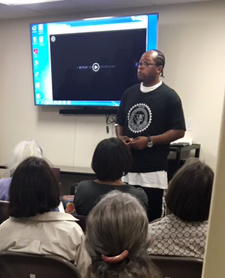By Laura Berland
Clarence Blevins gave face and voice to the prison population, sharing his experience of spending almost 25 years in Massachusetts’ prisons (including significant time in solitary confinement) at a presentation and film on criminal justice attended by about 70 people in Bemis Hall.
After being incarcerated at a young age, Blevins described prison as a place where no one cares, rehabilitation efforts are virtually nonexistent, and waiting lists for counseling and work programs can be up to three years. But while in prison, he began to read and study and ”help himself because there is no other help offered,” he said at the June 11 event. Today he is a motivational speaker who addresses students, at-risk youth, community-based organizations, and others about his experiences and criminal justice reform and is passionate about helping young people avoid bad decisions that result in incarceration.
The documentary 13th (the title refers to the 13th amendment which forbade involuntary servitude—thus ending slavery—except as a punishment for crimes) was also shown. Through interviews, photos, music and video clips, director Ava DuVernay’s film looked at the effects of convict leasing, lynching, Jim Crow laws, and the war on drugs on minority communities which, by the late 20th century, resulted in a disproportionate incarceration of people of color.
Afterwards, State Senator Mike Barrett opened the floor to responses and questions from the audience. One participant sharing feelings of “shame;” others talked of the need to do something and asked Barrett and Blevins for suggestions.
Barrett discussed the bill he’s sponsoring that aims to restrict “fine-time” sentences—numerous fees that burden low-income defendants and may result in incarceration for failure to pay. He also advocated ending mandatory minimum sentences for all but murder, along with other legislative proposals regarding bail reform and solitary confinement.
Blevins spoke about the Massachusetts Bail Fund which assists those who can’t afford to post bail by paying up to $500, and a number of organizations including Span, Inc., which assists former prisoners to achieve healthy, productive and meaningful lives.
A follow-up session is planned for the fall.

